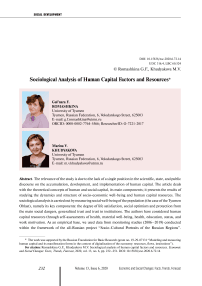Sociological analysis of human capital factors and resources
Автор: Romashkina Gulnara F., Khudyakova Marina V.
Журнал: Economic and Social Changes: Facts, Trends, Forecast @volnc-esc-en
Рубрика: Social development
Статья в выпуске: 6 т.13, 2020 года.
Бесплатный доступ
The relevance of the study is due to the lack of a single position in the scientific, state, and public discourse on the accumulation, development, and implementation of human capital. The article deals with the theoretical concepts of human and social capital, its main components; it presents the results of studying the dynamics and structure of socio-economic well-being and human capital resources. The sociological analysis is carried out by measuring social well-being of the population (the case of the Tyumen Oblast), namely its key components: the degree of life satisfaction, social optimism and protection from the main social dangers, generalized trust and trust in institutions. The authors have considered human capital resources through self-assessments of health, material well-being, health, education, status, and work motivation. As an empirical base, we used data from monitoring studies (2006-2019) conducted within the framework of the all-Russian project “Socio-Cultural Portraits of the Russian Regions”. We used the index method, correlation method, factor and variance analysis in the study. The results obtained made it possible to give a general assessment of the processes of human capital resources development, to identify the contradictions in the public consciousness, to determine the relationship between human capital resources and social capital. In particular, the research showed that social capital is associated with the citizens’ feeling protection from the main problems and dangers, and it has a weak but statistically stable connection with the components of social and material well-being. The authors note that life satisfaction, social optimism, self-esteem of protection from problems and dangers and trust in institutions increase with the growth of family’s material security. Achievement motivation, which is a necessary condition for the development of human capital resources, is currently not related to the status of a respondent, his or her material wealth and social capital.
Human capital, social capital, social well-being, life satisfaction, social optimism, social security
Короткий адрес: https://sciup.org/147225506
IDR: 147225506 | УДК: 316.4 | DOI: 10.15838/esc.2020.6.72.14
Текст научной статьи Sociological analysis of human capital factors and resources
The issues of accumulation, development, and realization of human capital today are among the most discussed at all levels: scientific, state, and public one. Attention to human capital is historically attributed to the works of J. Mincer [1], T. Schultz [2], G. Becker [3], where it was considered through investments in a person that increase his or her ability to work (including education, professional skills, and health) [4; 5; 6].
The concept of human capital also includes consumer spending (food, clothing, housing, education, health, culture) and government spending for these purposes1, designating the specified body of research as “cost” or “investment” approaches.
In this article, we base on the resource approach to measuring human capital, when the resources that people possess are considered key ones for achieving economic and other important results. This determines the importance of micro-level measurements [7]. Human capital, in turn, serves as a resource for development and competitiveness, as N. Olimpia justifies it in the EU countries review [8].
In economic and sociological concepts, human capital was interpreted as a set of professional knowledge, skills and abilities acquired in the process of education and advanced training. While P. Bourdieu did not distinguish the concept of human capital from the forms of cultural capital [9], J. Coleman considered it through the prism of rational choice, and M. Granovetter analyzed it in the sociology of labor markets [10].
Russian researchers did not stay away from the discussion. According to V. Radaev, in the situation with human capital, science deals with reflexive knowledge, designed to translate the development of new skills, institutionally supported by a system of formal certificates, diplomas, grades, etc. This knowledge is associated with the socio-professional stratification system, for example, certificates open access to certain types of economic activity [11, pp. 26–27]. The labor market was systematically studied by R.I. Kapelyushnikov and V.V. Potapenko through the tools of human capital [12; 13; 14]. V.E. Gimpelson concluded that the structural features of the Russian labor market are identified within the framework of the investment concept of human capital value assessment [15].
Human capital was considered as an integral sum of several components, such as health, knowledge, culture and individual freedom at the micro-level [16], as well as a resource for the development and modernization of the economy [11; 17]. The results obtained by the researchers were different in their degrees of success and demand. However, we again find conditional poles: the micro- /macro-level ones by the data source and the soft / hard ones by the method of building models.
These approaches are not free from drawbacks. For example, there is no stable empirical evidence for the theoretical assumptions that the accumulation of individual attributes of human capital leads to the expected economic and social returns at a certain level of aggregation. P. Wright and G. McMahan suggested that motivation can bridge the gap between skills and behavior [18]. On the one hand, it seems most promising to consider stable characteristics, such as intelligence, personality and physical attributes, on the other hand, flexible characteristics, usually measured through human behavior, are no less important, taking into account knowledge and skills that can change but remain fairly stable after acquisition [19]. The dynamic aspect of the problem including the concepts of “change”, “accumulation”, “development”, and “return” is also significant.
According to E. Rory, A. Crocker, the studies on human capital resources should be enriched by the consideration of social relations. The concept of social capital is particularly useful here. The authors explain that the social capital of a single (internal) level coexists with the resources of human capital (knowledge, skills, abilities, and other characteristics), and for their strategic use, people can get access to external social capital [20].
A significant amount of literature on the theory of social capital does not create a unity of the concept’s practical applications. In P. Bourdieu’s structuralist constructivism, social capital is characterized through the totality of all types of real or potential resources associated with belonging to a group and involvement in a stable network of social ties [9]. Social capital in this case is created in the interactions of actors in social fields and is structured according to their actual advantages and resources. At the same time, R. Putnam emphasized the importance of trust, networks, and the related norms of reciprocity [21], and F. Fukuyama included a system of informal rules and social norms in the concept [22]. J. Coleman emphasized actor’s rationality when choosing trust relationships as a good [23].
Many subsequent studies conducted using various methods confirm the heterogeneity of social capital [24; 25; 26]. Moreover, there is no generally accepted structure of social capital in science to measure it, but it always includes trust which can be generalized and/or institutionalized.
We will not discuss the possibilities of measuring social capital, including trust as a factor of human capital, while agreeing on the limited sufficiency of this measure. Let us note that generalized trust which is understood as trust in strangers is often interpreted as an individual resource [27], and institutional trust is often interpreted as a social result [21]. In this case, we have adopted the principle of minimality for creating search models.
Thus, the analysis of the world and Russian studies on human capital reveals insurmountable gaps between theoretical and empirical results. In addition, it is still unclear how the dynamic aspect is considered; the form of identifying the return on human capital is also not obvious. The focus of our research was directed to the detection of these problems.
The multilevel approach implies that the individual resources of human capital include accumulated education, health, status at work, income and labor motivation as a willingness to work putting the maximum effort. The accumulation of human capital at the mesolevel (firms, region) is influenced by various external factors. We did not purpose measuring human capital directly in the form of a single index in our work. We show that a single index of human capital is not informative due to the incoherence of its individual components. For human capital resources development, a favorable environment is created by social capital as an asset embedded in the relationships of individuals, communities, and networks. We consider the concept of social well-being at the meso-level as a social return. We assume that average assessments of social well-being and trust in government institutions increase in a prosperous society, but this relationship does not always have a micro-level effect.
The research purpose is to identify the features and significant factors in the development of human capital resources. The research objectives include the analysis of the main resources of human capital; measurement of basic components of social well-being; determination of the level of trust in social institutions and generalized trust affecting the resources of human capital; explanation of factor structuring components of social wellbeing and human capital.
Scientific problems
Science has moved аrom direct measurement of the amount of accumulated wealth in monetary units to the study of human capital specific qualities and aspects, which can be shown by the results of research presented by A.O. Akulov and N.A. Shepeleva [28]. N.E. Tikhonova determines economic, qualification, power, symbolic, cultural, and personal types of human capital resources [29]. O.I. Shkaratan divides human and other types of capital [30]. According to V.A. Davydenko, the theory of human capital is involved in the study of the stratification of society through indicative, complex or integral approaches [31].
In the Russian scientific discourse, the question of who is responsible for the accumulation of human capital resources is relevant. On the one hand, the state should provide the necessary conditions for this. N.I. Lapin, V.A. Ilyin, M.V. Morev made a conclusion about “the stagnant weakness of Russia as a social state” and the need to move to a “humanistically oriented social state” [32, p. 15]. On the other hand, citizens who are independently responsible for meeting their basic needs should be active and motivated to work. V.V. Karacharovsky and O.I. Shkaratan showed that people perceive the need for essential benefits differently. The main one is the need for “humanitarian benefits” and “protective benefits” that provide state functions, as well as “industrial benefits” that ensure the society’s functioning and development [33, p. 27]. The results of our study indirectly confirm the validity of these postulates.
According to the generally accepted point of view, the main channel of human capital development is education [18; 34; 35]. Numerous reforms of the education system aimed at its “modernization” have not led to systemic improvements. Currently, the Russian education system poorly performs the functions of forming modern human capital [36, p. 150].
Studying the Russians’ level and quality of life in the conditions of periodic crises, the researchers of the Institute of Sociology of RAS have noted that the segments of the population secured with resource are able to withstand the pressure of economic fluctuations, which is based on investments in human capital (while maintaining the satisfaction of their basic needs) [37, p. 15–17]. This conclusion is also important for the purposes of our analysis.
Methodology and methods
The study is based on data obtained over 15 years in the framework of the all-Russian project “Socio-Cultural Portraits of the Russian Regions”, the methods and results of which were published earlier [38, pp. 243–250, 305–310]. The research methodology and the justification of the sample structure are given in detail, for example, in the collective monograph [39, pp. 67–74], a number of sample characteristics are presented in insert 1 .
The structure of the main components is described in insert 2 . The study included selfevaluation of material-wealth (1) (hereinafter – the material well-being), evaluation of social well-being: life satisfaction (2), social optimism (3), and the degree of security from main social hazards (4). Social capital includes generalized trust (5.1), level of citizens’ confidence in basic social institutions (institutional trust) (5.2). The concept of social capital is not limited to trust, including the density and coverage of social connections, but these important indicators were not used in this article.
Evaluation of human capital (hereinafter – HC) has been carried out through indicators of education (6), self-assessment of health (7), number of subordinates (8) and type of work motivation (9). HC resources at the micro-level include indirect assessment of income the level of which is determined by using conditional scale fixing the respondents’ self-assessment of their material well-being (Tab. 1; Insert 3). We used the measuring of social well-being of the population; the interest in these issues is always in the focus of research by Russian sociologists. The methods of metrics calculating significantly depend on the researchers’ goals [40; 41, p.66; 42; 43, p. 59; 44]. We understand social well- being as an integral characteristic that combines life satisfaction in general, social optimism and a sense of security (see insert 2).
For the analysis, we used the index method, correlation (according to Spearman), significance testing according to the ANOVA table, factor analysis, and classification based on the analysis of variance.
Our main hypothesis is that there is a mechanism for the accumulation and development of human capital, which involves the creation of an environment with open social elevators, and trusting relationships are supported by society. Factors of human capital at the meso-level are social well-being and social capital. However, it is difficult to separate factors and effects in public relations. We assume that there is a mutual influence between them. HC resources are affected by the level of generalized trust, understood as trust in strangers in general. The level of trust in the system of institutions is the result of wellfunctioning public relations. The second-level hypothesis is that the resources that people directly possess (education, age, health, and achievable work motivation) play an important role in the effectiveness of this mechanism.
Scientific results and discussion
The main components of human capital, social well-being, and social capital in dynamics for the period from 2006 to 2019. Based on an indepth study of social stratification in Russia, L.A. Belyaeva concluded (data for 2016 are given) that “conditionally disadvantaged strata of society” (the first three lower strata) accumulate 51% of the country’s population, and 44% are prosperous [45, p. 95]. In the Tyumen Oblast, according to the population’s self-assessments, the lower segment is much narrower: the low-income strata make up 42%, while 58% assess their resources as sufficient ( Fig. 1 ). The dynamics of the material standard of living in the region during the entire
Figure 1. Dynamics of self-assessments of the population segments’ well-being, 2006–2019, % of the respondents’ number
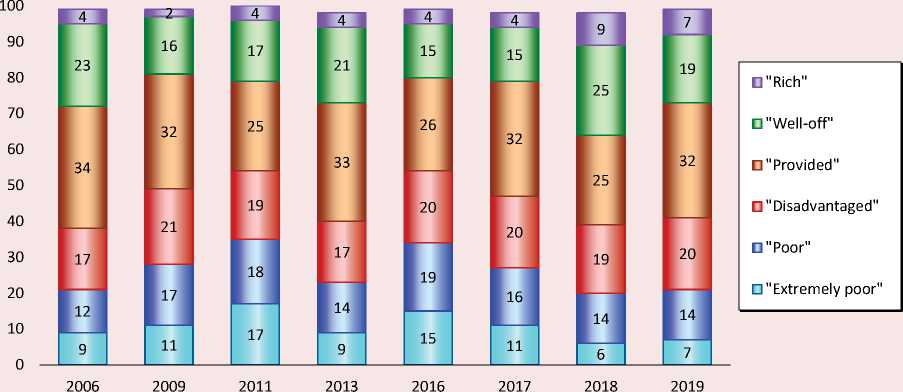
Source: own calculation based on the data of socio-cultural monitoring in the Tyumen Oblast.
observation period is more prosperous than the average for Russia. In the crisis-stagnant years (2011, 2016), the financially disadvantaged stratum included 54% of the region’s residents. But even in the most “prosperous years”, when Russia’s budget was overflowed with “oil money”, this segment did not make up 38%, which means that more than a third of the inhabitants of a relatively prosperous region of Russia practically did not benefit from the “oil boom”.
Considering the resources of human capital according to the components indicated above, we should note the following.
The all-Russian trend of population ageing is also typical for the Tyumen Oblast. Over the past ten years, the share of people of working age in the region has decreased by 7.6% (65.1% in 2006; 57.5% in 2016), the share of the older generation has increased by almost 4% (17.6% in 2006; 21.4% in 2016)2. According to the population’s self-assessments, slightly more than 40% of the Tyumen Oblast’s residents believe their health is “normal”, they do not complain of diseases, and this indicator does not change much throughout the entire period (Fig. 2).
Statistical data confirm the results of empirical studies. During 2018, less than 40% of the adult population did not apply to health care centers. The number of diseases detected for the first time decreased significantly (by 22%). If in 2006, 824 cases of diseases per 1000 inhabitants were detected for the first time, then this figure was 639 in 2018. The number of disabled people has decreased by 7%3.
Figure 2. Distribution of responses to the question “How do you assess your health?”, 2006–2019, % of the respondents number
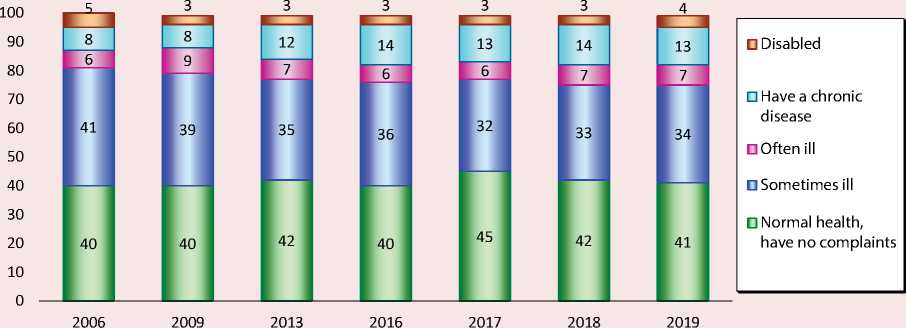
Source: own calculations based on the data of socio-cultural monitoring in the Tyumen Oblast.
Figure 3. Distribution of answers to the question about the level of education of the Tyumen Oblast residents, 2006–2019, % of the number of respondents
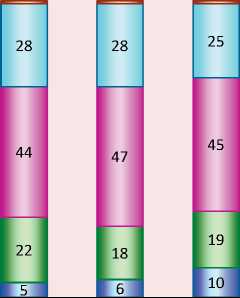
I------1
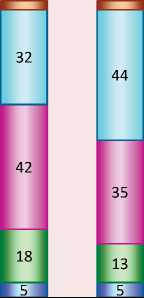

-
□ Postgraduate, academic degree
-
□ Higher
(bachelor, specialist, master)
о Vocational
(primary, secondary)
-
□ General full (11 classes)
-
□ General (8-9 classes)
2006 2009 2013 2016 2017 2018 2019
Source: own calculation based on the data of socio-cultural monitoring in the Tyumen Oblast.
Modern economic development requires a higher level of professional training in most jobs. This trend determines an increase in the share of people with higher education, and at the same time a decrease in those who has limited to a lower level of education and vocational training ( Fig. 3 ).
Thus, compared to the beginning of the period (2006), the number of the region’s residents with higher and postgraduate education increased almost 1.5 times42. A positive impact on HC resources is provided by the presence of an achievable work motivation
4 Regions of Russia. Socio-Economic indicators. 2019. Appendix to the collection. Available at: http://old. publications/catalog/doc_1138623506156 (accessed: September 18, 2020)
among the majority of employees. If, according to the results of the 2006 monitoring study, 48% of respondents were assigned to the group of “achieving success” motivation type, then by 2019 their share increased to 70%. The majority (83%) of people are satisfied with their work (46% are quite satisfied, 37% are rather satisfied). A little more than a third of the respondents (32%) would like to keep their position (we should note that a third of respondents have subordinates in the main job); a fifth (21%) are ready for promotion and taking more responsibility according to their own estimates, and the same number (21%) would like to start their own business. Economic instability makes people searching for certain guarantees. Thus, during the study period, the proportion of those who would prefer to have a small but solid income and confidence in the future increases (from 42% in 2006 up to 51% in 2019), and the share of people who are ready to earn a lot without guarantees for the future is decreasing (28 and 19% in 2006 and 2019, respectively).
Let us move on to the characteristics of social well-being. The first component of the social well-being index is the degree of satisfaction with life in general. In the Tyumen Oblast, this indicator has increased: the share of people who are satisfied with their lives (the answer options “fully satisfied” and “rather satisfied”) increased from 49% in 2006 to 68% in 2019, and the average life satisfaction index was LsI = 0.69.
Let us consider the structure of the region residents’ protection index, the basis for calculating which is the respondents’ answers to the questions ( 4, Insert 2 ) about the 11 most urgent problems and dangers ( Fig. 4 ).
The main problem of Russian citizens, recorded in all studies after the 1990s, is poverty. However, in the 2000s, the officials’ arbitrariness was added to it: in the Tyumen Oblast, the level of severity of this problem reached 0.44. Next in terms of relevance are the problems of crime (PI = 0.48) and losing job (PI = 0.47). The latter is important for further analysis.
Figure 4. Structure of the protection index, 2019 (Protection Index – PI) on a scale from 0 (all completely unprotected) to 1 (all fully protected)
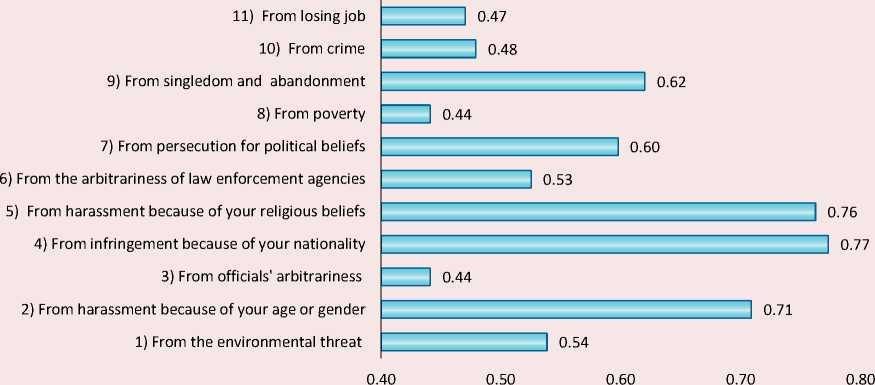
Source: own calculation based on the data of socio-cultural monitoring in the Tyumen Oblast.
On average, the protection index for the 11 problems listed is 0.58. Thus, the actualization of the first level problems (ensuring life) reduces the importance of humanitarian problems for people. These aspects will be discussed in our following works.
Low-income populations consider themselves to be the most vulnerable groups (“extremely poor” and “poor”), their PI is 0.48, as well as people over 54 years of age (PI = 0.46). Rich people feel the most protected (PI = 0.7). Compared to previous years, the spread in estimates between the extreme lower and upper layers in terms of material well-being has significantly increased (0.15 in 2018 and 0.22 in 2019). That is, there is a growing spread in the estimates of the components of social well-being between the lower and upper layers of the social pyramid.
According to our data, the lowest estimates of the dynamics of the current situation were given in 2009 (0.43) and 2016 (0.42), while the share of those who hope for improvements in the next year is increasing. But as soon as the economic situation levels out, people stop expecting their situation to improve in the near future. Strategic optimism of our citizens remains high, it is similar to the dynamics of overall life satisfaction in general (Fig. 5).
There are little differences in the type of settlement and gender factor in the structure of social optimism and life satisfaction indices. The most elastic index of life satisfaction in terms of social structure increased sharply in the group of the richest (LsI = 0.88) and decreased in the group of the least provided (LsI = 0.48). The protection index is the least elastic, but it also increases with the growth of the material standard of living.
Statistically significant is the drop in the level of education and qualifications of a person, which affects the decline in his or her social well-being. Here we may observe the connection between the HC resources and
Figure 5. Dynamics of the social well-being index components, 2006–2019
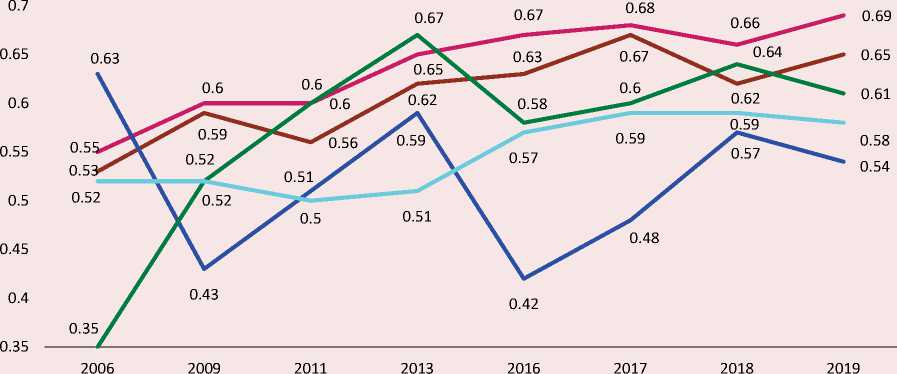
^^^^^ ■ i Life satisfaction, LsI ^^^^^™ Strategic optimism, StrI
^^^^^^eAssessment of the current period, AcpI ^^^^^^eTactical optimism, ToI
^^^^^ ■ i Protection Index, PI
Source: own calculation based on the data of socio-cultural monitoring in the Tyumen Oblast.
social well-being. As expected, the social well-being index reaches its highest value in the upper social group. These differences are mainly due to the strategic levels of optimism and satisfaction with life in general. The ANOVA test5 confirms the maximum statistical stability of differences in the social structure
(material well-being) of the protection indices (F = 21.5, p <. 001), social optimism (F = 65.7, p <. 001), social well-being (F = 61.3, p <. 001).
We should note a steady decline in all components of social well-being with increasing age ( Fig. 6 ). Life satisfaction and social optimism especially sharply decreases in case
Figure 6. Dynamics of the components of the social well-being index (SwI): life satisfaction in general (LsI), protection index (PI), components of social optimism (StrI, TpI, AcPI), trust in institutions (TrI) by age for men and women, 2019
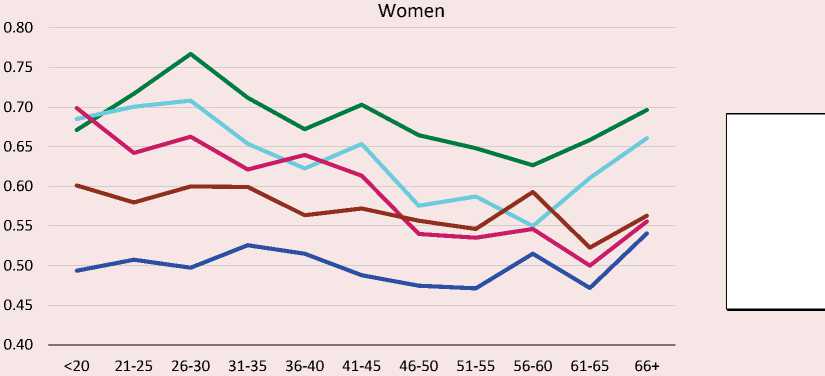

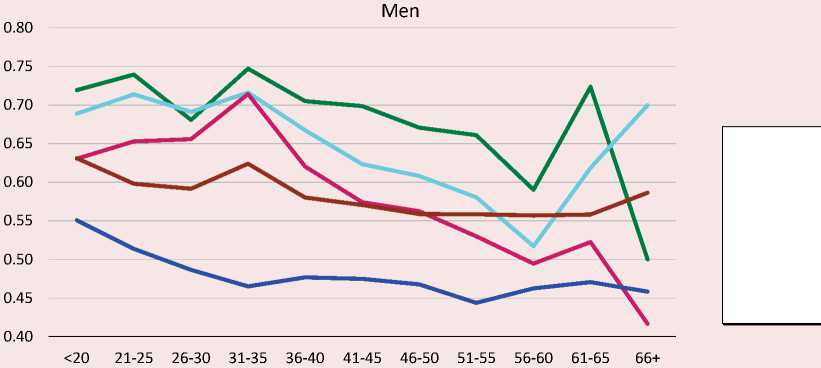
Source: own calculation based on the data of socio-cultural monitoring in the Tyumen Oblast.

of men over 60 years old, women over 55 years old, while life satisfaction in general slightly increases. The failure of the protection index in case of women corresponds to the period of pre-retirement age (51–55 years old); in case of men, there are no such fluctuations and the protection index is consistently equal to 0.56, except for the oldest age group.
According to the first level hypothesis, the HC resources are affected by the level of generalized trust, and the level of trust in the system of institutions acts as a social result.
The dynamics of the levels of generalized trust and trust in institutions (measured by questions 5.1 and 5.2 of Ins. 2) are presented in table 1 .
Trust changes very slowly in dynamics in society, but there are more of those who “do not trust” in our society than the “trusting”. The level of generalized trust is most closely related to self-assessment of financial status, age, and self-assessment of health. Thus, according to 2019 data, the level of generalized trust is on average 0.54 in the “rich” group versus 0.41 in the “extremely poor” group. The highest level of generalized trust is among the representatives of older age groups (0.54 in the cohort of 61– 65 years old, 0.43 in the group over 70 years old). But the fastest decline in generalized trust occurs on the scale of self-assessment of health (0.37 in the group “I have a disability”).
The level of trust in institutions is significantly lower than the level of generalized trust. We should recall that the last indicator includes an assessment of trust in 16 civil society institutions (Fig. 7).
Employers are leading in the structure of trust. This trend is typical for the whole world. The Internet media and political parties are dragging behind, which is also quite consistent with the data of the world sociological agencies research.
Let us consider the results of a factor analysis aimed at identifying the relationship between the components of human capital, social wellbeing, generalized and institutional trust (a total of 14 components, see insert 3). In addition to the above mentioned, we used the concept of achievement motivation in the analysis. The identification of motivation types was justified earlier [46, p. 152]. We have chosen the method of K-means with rotation, normalization of initial indicators, allocation of principal components by Kaiser. The factor analysis algorithm is constructed in such a way that the structure of latent factors in the original multidimensional space is further subjected to the rotation procedure to achieve the maximum approximation to orthogonality (for example, see [47, p. 87]). Thus, the main components actually reflect the internal (latent) interdependencies between the indicators included in the analysis, their ranking according to the degree of significance in the final factor structure. Orthogonality is proved by the absence of a relationship
Table 1. Dynamics of average values of trust assessments, Tyumen Oblast, 2006–2019, % of the number of respondents
|
2006 |
2010 |
2011 |
2013 |
2016 |
2017 |
2018 |
2019 |
|
|
Generalized trust* |
- |
- |
- |
0.46 |
0.45 |
0.47 |
0.47 |
0.47 |
|
Trust in institutions** |
0.27 |
0.31 |
0.26 |
0.29 |
0.35 |
0.35 |
0.34 |
0.30 |
Source: own calculation according to the socio-cultural monitoring in the Tyumen Oblast. |
||||||||
Figure 7. Structure of the index of trust in institutions, index values in 2018, 2019
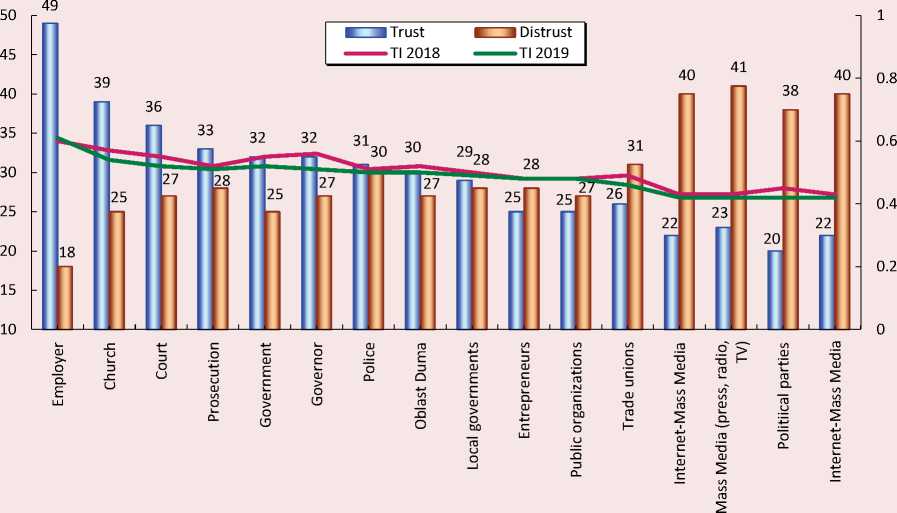
Source: own calculation according to the socio-cultural monitoring in the Tyumen Oblast.
between the principal components. The error of the method is manifested in the residual variance (remainder) and the presence of weak, but relationships between the factors. Quantitative error measures of the method (measure of adequacy and Bartlett’s test) confirm the satisfactory suitability of the data for factor analysis at a significance level of p < 0.001 ( Tab. 2, Insert 3 ). By the principal component method with Kaiser normalization, we have algorithmically identified four principal components (factors) ( Tab. 1, Tab. 3, Insert 3 ). The obtained result explains 54.87% of the total variance. One of the secondary outcomes of the factor procedure is the ability to interpret the resulting factor through regression with the corresponding components and weight loads.
According to the factor analysis results, the components that are usually included in the HC (self-assessment of health, level of education, type of work motivation, self-assessment of material well-being) were assigned to different factors – the first, third and fourth (Tab. 2).
We should note that the obtained factors leave 45.13% of the variance unexplained and are not completely orthogonal. The largest share of errors is given by self-assessments of material well-being, level of education and status at work (number of subordinates).
Factor 1 reflects all three components of social optimism (0.748, 0.736, 0.683), life satisfaction in general (0.64) and selfassessment of health (90.55). It is believed that this is the main factor explaining the largest share of aggregate variability, in this case 19.69%. To the greatest extent, the first factor is associated with the level of social optimism. For the purposes of our work, it is important to emphasize that only self-assessments of health level, that is, the first individual resource of
Table 2. Main components of factor analysis with Kaiser normalization
|
Factor 1 |
Factor 2 |
Factor 3 |
Factor 4 |
|
|
3.3 ToI |
0.748 |
0.102 |
0.146 |
|
|
3.2 AcpI |
0.736 |
|||
|
3.1 StrI |
0.683 |
0.387 |
0.211 |
|
|
2. LsI |
0.64 |
0.324 |
0.23 |
|
|
7. Health assessment |
0.55 |
0.182 |
-0.175 |
|
|
5.2 Trust in institutions |
0.188 |
0.743 |
||
|
4. PI |
0.28 |
0.712 |
||
|
5.1 Generalized trust |
0.644 |
-0.184 |
||
|
9.2 If you have the opportunity to change jobs, what do you choose |
0.14 |
0.763 |
||
|
9.1 What job would you prefer |
-0.116 |
0.704 |
0.23 |
|
|
Age groups |
-0.262 |
-0.646 |
0.324 |
|
|
8. Do you have subordinates in your main job |
0.179 |
-0.18 |
-0.191 |
0.666 |
|
6. Education |
-0.218 |
0.16 |
0.324 |
0.57 |
|
1 Material well-being |
0.438 |
0.171 |
0.113 |
0.515 |
|
Source: own calculation according to the socio-cultural monitoring in the Tyumen Oblast. |
||||
HC, were included in human capital out of its traditional components. Self-assessment of material well-being (the second individual resource of HC) correlates with the main factor at the level of 0.438. At the same time, age and level of education are opposite in relation to the first factor. In other words, the first factor reflected the signs of higher social well-being, life satisfaction, and self-assessment of health, and it is more significant for younger and less educated respondents.
Factor 2, first of all, reveals people’s perception of social capital components (generalized, institutional trust and protection from problems and dangers), explaining 13.17% of the total variance. This factor is not orthogonal to the first one, since there are correlations with strategic optimism (0.387) and life satisfaction in general (0.324). It is important to note that the connection of factor 2 with HC resources is very weak.
Within the framework of factor 3, variables characterizing the type of work motivation and the age of the respondent were grouped, including 12.46% of the total variance. Since factor 3 is negatively associated with age, the achievable type of work motivation is more typical for young respondents, whereas for older cohorts, the motivation to avoid failure is more pronounced [48]. Factor 3 is positively associated with the level of education (0.324). That is, the achievable type of work motivation increases for younger and more educated respondents. This factor is not related to the second and first factors. The latter means that an increase in the achievable type of work motivation is not reflected in a higher level of social optimism, social capital and selfassessments of material well-being.
Factor 4 links social status (number of subordinates and level of education) and material well-being, explaining 9.55% of the total variance. In addition, it is positively associated with age (0.324) and weakly correlates with the optimism factor.
Thus, the latent structure of human capital in the analyzed case is divided into three loosely connected components. Self-assessments of health, once in the first factor, are closely related to such indicators as positive social well-being and life satisfaction in general. Status, education, and material well-being included in factor 4 were orthogonal to factor 3, which accumulated the components of labor achievement motivation. This negative factor syndrome is mitigated by positive trends in the growth of the average standard of living, life satisfaction in general, strategic optimism along with the components of factor 4. Selfassessments of health decrease simultaneously with the growth of factor 4.
The results of factor and correlation analysis confirm the truth of the hypotheses only partially.
Conclusion
The paper attempts to reveal the main contradictions of empirical studies on human capital. Above, we drew attention to the fact that the resources of human capital traditionally include accumulated education, health, status at work, income and labor motivation as a willingness to work putting the maximum amount of effort. At the meso-level, we have confirmed the positive dynamics of human capital resources. At the same time, different resources of human capital at the micro level demonstrate different structural relationships.
The theoretical significance of the research results lies in the approbation of an algorithm that allows aggregating human capital resources obtained at the micro level. And this, in turn, is of value for further analysis and interpretation of the results of applied research.
Theoretical concepts reflect the belief that developed human capital gives chances for higher economic and social results. If the results were considered at the macro-level, it was about differences in the development of countries, regions, depending on the reserves (or resources) of human capital. If the study was based on the micro-level, theoretical constructs assumed that the accumulation of human capital resources gives their carriers, citizens, competitive advantages in the fight for rare resources. We assumed that the mechanism of human capital development consists in a positive relationship between the resources of human capital, social capital and social well-being as cumulates of self-assessments of life satisfaction in general, optimism, and protection, which can be called a social result for the meso-level.
If we consider social well-being as a social result of HC accumulation, it would be logical to assume that the increase in the level of social well-being for the meso-level (in dynamics over the years of monitoring) is reflected in microlevel relationships.
The positive dynamics of self-assessments of material well-being, the level of education, and the achievable work motivation of society over the past 13 years allowed us to assume that human capital resources increased in the region which is considered to be relatively prosperous by Russian standards (the Tyumen Oblast). At the meso-level, simultaneously with the resources of human capital, social well-being, the need for protection from losing job, crime, poverty and officials’ arbitrariness increased, the level of trust in institutions increased slightly, while the generalized trust remained unchanged.
During the observation period, the social stratification significantly increased, and therefore it was important to check how the resources and factors considered were expressed by social strata in different years of monitoring.
Life satisfaction, social optimism, a sense of security from the main problems and dangers and institutional trust increase along with the level of material well-being, which is especially relevant in the group of the most financially secure (“rich”). The index of generalized trust and the type of work motivation are not related to material well-being.
The level of education increases the selfesteem of the income level. Stable links between the level of education and the components of social well-being were not found in any of the monitoring waves. Weak correlations were rather reversed, but they fluctuated depending on the wave, that is, education in our case does not work as a social elevator to the extent that theoretical constructions dictate to us.
The results of factor analysis partly confirm the above conclusions, partly expand the picture, given that the result is the construction of latent factors. Human capital resources are not built in the form of a unidirectional factor. Social optimism, life satisfaction in general, health, education (feedback), and self-assessment of material well-being are interrelated, but the connections are different in strength.
The first three components were included in the first factor of the latent factor structure. The first factor clearly includes only self-assessment of health out of HC resources. The resources of social capital were integrated into the second factor.
Work motivation is attributed to the third factor, while achievement motivation is significantly more pronounced for young respondents. The third factor is weakly related to tactical optimism (regarding the near future), self-assessment of health. The fact that healthy and young people are more optimistic is a fairly trivial result, which rather works to confirm the validity of our tools. A meaningful conclusion is that social capital indicators, such as generalized trust, trust in institutions and a sense of protection, are loosely associated with social optimism and material well-being, which confirms the actual separation of these groups of variables into various factors. The practical conclusion is that the combination of the considered components into a single index of human capital is not empirically justified. In addition, it is shown that social capital in the considered society does not work as a social result at the meso-level.
The main hypothesis of the work was partially confirmed. In prosperous periods, social well-being, social and human capital types in the region grow, but there are certain restrictions that do not allow us to talk about the general nature of such an increase. According to general estimates obtained on the example of the society of the Tyumen Oblast, 40–50% of the population is involved in the processes of social and human capital accumulation. Partial confirmation of the second-level hypothesis demonstrates that high levels of HC resources correspond to an increased sense of social wellbeing, protection, and trust in institutions. however, the latter does not apply to generalized trust.
The limitations are the weak coherence of the dynamics of the HC resources, the level of security and social optimism, which also causes partial confirmation of the second-level hypothesis. The considered interdependencies are not unidirectional, they indicate significant distortions in the public consciousness and the processes of supporting the accumulation of human capital. The main contradiction observed is the lack of connection between the components of achievable work motivation and other human capital resources, such as material well-being and professional status at work, measured in terms of the number of subordinates. Achievement motivation, which according to theoretical concepts is a necessary condition for the development of human capital, is currently poorly related to the status of the respondent and generalized trust. One of the important problems of Russia is that the need to develop an achievable work motivation is not confirmed in real practices. The accumulation of social capital is strongly associated with the citizens’ feeling of protection from the main problems and dangers and weakly (but statistically stable and reliably positive) with social and material wellbeing.
Список литературы Sociological analysis of human capital factors and resources
- Mincer J. Investment in human capital and personal income distribution. Journal of Political Economy, 1958, vol. 66, no. 4, pp. 281–302.
- Schultz T. W. Investment in human capital. Am. Econ. Rev., 1961, no. 5, pp. 1–17.
- Becker G. Investment in human capital: A theoretical analysis. In: NBER special conference 15, supplement to J Polit Econ, 1962, no. 70 (5), part 2, pp. 9–49.
- Mincer J. Studies in Human Capital: Collected Essays of Jacob Mincer. Cambridge: Cambridge University Press, 1993. 389 p.
- Barney J. B. Gaining and Sustaining Competitive Advantage (4th ed.). Boston, MA: Pearson, 2011. 520 p.
- Hatch N.W., Dyer J.H. Human capital and learning as a source of sustainable competitive advantage. Strategic Management Journal, 2004, no. 25, pp. 1155–1178.
- Lutz W., Butz W.P., Samir K.C. (ed.). World Population & Human Capital in the Twenty-First Century: An overview. Oxford University Press, 2017. 168 p.
- Olimpia N. Disparities regarding competitiveness, human capital and inclusive development in the EU: A cluster analysis. Annals of Constantin Brancusi University of Targu-Jiu. Economy Series, 2019, no. 1, pр. 61–71.
- Bourdieu P. Ökonomisches Kapital, kulturelles Kapital, soziales Kapital. Kreckel R. (Hrsg.). In: Soziale Ungleichheiten: Sonderband 2 der «Sozialen Welt». Göttingen, 1983, pp. 183–196.
- Granovetter M. Society and Economy: Framework and Principles. Cambridge, MA: The Belknap Press of Harvard University Press, 2017. 256 p.
- Radaev V.V. Term of capital, forms of capitals and their conversion. Ekonomicheskaya sotsiologiya=Economic Sociology, 2002, no. 4, pp. 20–32. Available at: https://ecsoc.hse.ru/2002-3-4/annot.html#doc_26593609 (accessed 05.05.2020) (in Russian).
- Kapelyushnikov R.I. Zapiska ob otechestvennom chelovecheskom kapitale [Note on the Domestic Human Capital]. Moscow: HSE Publishing House, 2008. 56 p.
- Kapelyushnikov R.I. Skol’ko stoit chelovecheskii kapital Rossii? [How Much is Russia’s Human Capital Worth?]. Moscow: HSE Publishing House, 2012. 76 p.
- Potapenko V.V., Shirov A.A. The labor market and the quality of human capital. EKO=ECO, 2018, no. 2, pp. 18–35 (in Russian).
- Gimpel’son V.E., Kapelyushnikov R.I., Sharunina A.V. Nizkooplachivaemye rabochie mesta na rossiiskom rynke truda: est’ li vykhod i kuda on vedet? [Low-Paid Jobs in the Russian Labor Market: Does Exit Exist and Where does it Lead to??]. Moscow: HSE Publishing House, 2018. 58 p.
- Rimashevskaya N. Human potential of Russia and the problem of “saving the population”. Rossiiskii ekonomicheskii zhurnal=Russian Economic Journal, 2004, no. 9-10, pp. 22–40 (in Russian).
- Nureev R.M. Ekonomika razvitiya: modeli stanovleniya i modernizatsii rynochnoi ekonomiki [Development Economics: Models of the Formation and Modernization of a Market Economy]. Moscow: Norma, 2008. 366 p.
- Wright P.M., McMahan G.C. Exploring human capital: Putting “human” back into strategic human resource management. Human Resource Management Journal, 2011, no. 21(2), pp. 93–104.
- Wright P.M., Coff R., Moliterno T.P. Strategic human capital crossing the great divide. Journal of Management: Special Issue: Strategic Human Capital, 2013, vol. XX, no. X, pp. 1–18.
- Rory E., Crocker A., Ahn Y. (ed.). Reflections on the micro-macro divide: Ideas from the trenches and moving forward. Strategic Organization, 2019, vol. 17(3), pp. 385–402.
- Putnam R.D. Social Capital: Measurement and Consequences. Canadian Journal of Policy Research, 2001, no. 2(1), pp. 41–51. Available at: https://smg.media.mit.edu/library/putnam.pdf
- Fukuyama F. Social capital, civil society and development. Third World Quarterly, 2001, no. 22 (1), pp. 7–20. DOI: 10.1080/713701144
- Coleman JS. Grundlagen der Sozialtheorie. Bd. 1. München: Oldenburg, XVI, 1991. Available at: https://www.suz.uzh.ch/dam/jcr:ffffffff-fad3-547b-0000-0000269bb1f5/12.13_coleman_90.pdf
- Lin N. Social capital: A theory of social structure and action. Cambridge University Press, 2001. 292 р.
- Leana C.R., Pil F.K. Social capital and organizational performance: Evidence from urban public schools. Organization Science, 2006, pp. 353–366.
- Panda D.K. Trust, social capital, and intermediation roles in microfinance and microenterprise development. VOLUNTAS: International Journal of Voluntary and Nonprofit Organizations, 2016, vol. 27, pp. 1242–1265. Available at: https://doi.org/10.1007/s11266-015-9678-8
- Siegelman B., Haenn N., Basurto X. Lies build trust: Social capital, masculinity, and community-based resource management in a Mexican fishery. World Development, 2019, vol. 123. DOI: 10.1016/j.worlddev.2019.05.031
- Akulov A.O., Shepeleva N.A. Specificity of human capital development in the industrial region (for example the Kemerovo region). Vestnik NGUEU=Vestnik NSUEM, 2016, no. 4, pp. 253–266 (in Russian).
- Tikhonova N.E. Resource approach as a new theoretical paradigm in stratification research. Sotsiologicheskie issledovaniya=Sociological Studies, 2006, no. 9, pp. 11–27 (in Russian).
- Shkaratan O.I. Sotsial’no-ekonomicheskoe neravenstvo i ego vosproizvodstvo v sovremennoi Rossii [Socio-Economic Inequality and its Reproduction in Modern Russia]. Moscow: ZAO «OLMA Media Grupp», 2009. 560 p.
- Davydenko V.A., Andrianova E.V., Romashkina G.F., Khuziakhmetov R.R. Interdisciplinary context of human capital study. Research program. Vestnik Tyumenskogo gosudarstvennogo universiteta. Sotsial’noekonomicheskie i pravovye issledovaniya=Tyumen State University Herald. Social, Economic, and Law Research, 2019, vol. 5, no. 4 (20), pp. 30–51. DOI: 10.21684/2411-7897-2019-5-4-30-51 (in Russian).
- Lapin N.I., Ilyin V.А., Morev M.V. Extremal inequalities and the social state (part 1). Sotsiologicheskie issledovaniya=Sociological Studies, 2020, vol. 46, no. 1, pp. 4–17. DOI: 10.31857/S013216250008378-8 (in Russian).
- Кaracharovskiy V.V., Shkaratan O.I. When not every good is good: Two dimensions of social choice. Sotsiologicheskie issledovaniya=Sociological Studies, 2020, vol. 46, no. 3, pp. 27–39. DOI: 10.31857/S013216250008810-4 (in Russian).
- Becker G. Human Capital: a Theoretical and Empirical Analysis, with Special Reference to Education. New York: National Bureau of Economic Research, 1964. 187 p.
- Judge T.A., Cable D.M., Boudreau J.W., Bretz R.D. An empirical investigation of the predictors of executive career success. Personnel Psychology, 1995, no. 48(3), pp. 485–519.
- Andrianova E.V., Davydenko V.A., Romashkina G.F. On the Consequences of Reforms in Education (results of the conference «Education: youth, competitiveness»). Sotsiologicheskie issledovaniya=Sociological Studies, 2019, no. 1, pp. 150–152. DOI: 10.31857/S013216250003757-5 (in Russian).
- Gorshkov M.K. et al. Rossiiskoe obshchestvo i vyzovy vremeni. Kniga pyataya [Russian Society and the Challenges of the Time. Book Five]. Ed. By M.K. Gorshkov, V.V. Petukhov. Moscow: Ves’ Mir, 2017. 427 p.
- Atlas modernizatsii Rossii i ee regionov: sotsioekonomicheskie i sotsiokul’turnye tendentsii i problem [Atlas of Modernization of Russia and its Regions: Socio-Economic and Socio-Cultural Trends and Issues]. Compiled and edited by N.I. Lapin. Moscow: Ves’ mir, 2016. 360 p.
- Andrianova E.V., Davydenko V.A., Danilova E.P., Mal’tseva N.V., Pecherkina I.F., Romashkina G.F., Tarasova A.N., Ushakova Yu.V., Khudyakova M.V., Cheblakov A.L. Novaya industrializatsiya: vozmozhnosti, ogranicheniya i protivorechiya sotsiokul’turnogo prostranstva. Monografiya [New Industrialization: Opportunities, Limitations and Contradictions of the Socio-Cultural Space. Monograph]. Tyumen’, 2018. 226 p.
- Kuchenkova A.V. Social self-perception and subjective well-being: A review of definitions and measurement models. Vestnik RGGU. Seriya «Filosofiya. Sotsiologiya. Iskusstvovedenie»=RSUH/RGGU BULLETIN. “Philosophy. Sociology. Art Studies” Series, 2016, no. 2 (4), pp. 27–37. Available at: https://cyberleninka.ru/article/n/sotsialnoe-samochuvstvie-i-subektivnoe-blagopoluchie-sootnoshenie-ponyatiy-i-sposobov-izmereniya (accessed: 02.05.2020) (in Russian).
- Latova N.V. Dynamics and factors of life satisfaction of Russians (1997–2017). Sotsiologicheskie issledovaniya=Sociological Studies, 2017, no. 12, pp. 65–78. DOI: 10.7868/S0132162517120078 (in Russian).
- Shklyaruk V.Ya. Preservation of health as a factor of social well-being of production personnel. Sotsiologicheskie issledovaniya=Sociological Studies, 2009, no. 12, pp. 139–141 (in Russian).
- Soboleva I.V. Social well-being of entrepreneurs and employees in small business. Sotsiologicheskie issledovaniya=Sociological Studies, 2019, no. 4, pp. 57–69. DOI: 10.31857/S013216250004586-7 (in Russian).
- Simonovich N.E., Kiseleva I.A. Economic, social and psychological security of modern society. Natsional’nye interesy: prioritety i bezopasnost’=National Interests: Priorities and Security, 2013, no. 45, pp. 53–57 (in Russian).
- Belyaeva L.A. Income inequality in Russian society: social consequences and issues. Vestnik Instituta sotsiologii=Bulletin of the Institute of Sociology, 2018, no. 3, pp. 84–100. DOI: 10.19181/vis.2018.26.3.526 (in Russian).
- Andrianova E.V., Romashkina G.F. Labor motivation: Problems, condition, prospects. Nauchnyi potentsial regionov na sluzhbe modernizatsii=Scientific Potential of Regions at the Service of Modernization, 2011, no. 1 (1), pp. 154–160 (in Russian).
- Strebkov D.O., Shevchuk A.V. Work values of self-employment and organization employment. Sotsiologicheskie issledovaniya=Sociological Studies, 2017, no. 1, pp. 81–93 (in Russian).
- Romashkina G. F., Andrianova E. V. The structure of values of the residents of russian regions, on the basis of a socio-cultural monitoring. Vestnik Tyumenskogo gosudarstvennogo universiteta=Tyumen State University Herald, 2014, no. 8, pp. 93–105 (in Russian).

